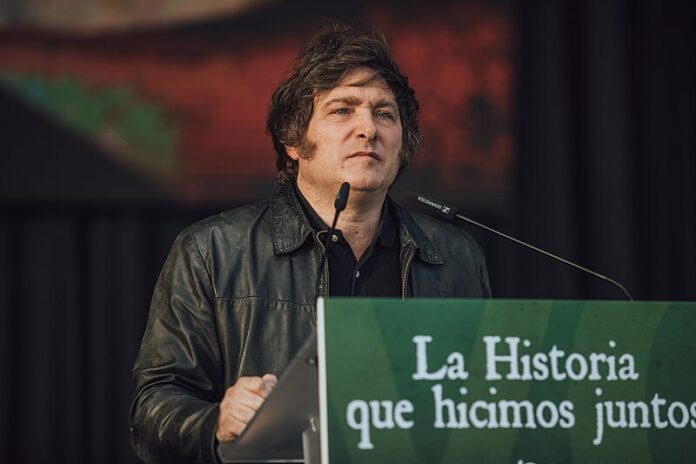Miguel Mendez – Chicago, IL (USA)
On October 22nd, in the midst of a very deep economic and social crisis (with inflation at more than 120% in the last 12 months and a poverty rate higher than 40% in June), Argentina held its presidential elections. The incumbent centre-left (Peronist) government in Buenos Aires stood Sergio Massa, one of its most neoliberal representatives, as the candidate in this election.
In August 2023, Argentina held its primaries which determine which candidates are going to stand in the presidential and legislative elections (Simultaneous and Mandatory Open Primaries- also known as PASO).
The PASO winner was Javier Milei, a far right “outsider” who got more than 30% of the votes. Milei, an ultra-liberal economist who was famous for participating in TV shows, presents himself as an “anarcho-capitalist”, praises Trump and Bolsonaro, denies the military dictatorship’s crimes in Argentina and promotes the destruction of the country’s social system.
Milei, among other policies, defends the abolition of the Argentinean Central Bank, the dollarization of the Argentine economy, denies the climate crisis and the rejects sex education in schools. Following the neofascist and far-right cookbook, Milei presented himself as a critic of the Argentine establishment and succeeded in achieving the preference of large sections of the middle and working classes.
In PASO, Milei got 30.4%, Sergio Massa 21.4%, Patricia Bullrich (representing the traditional neoliberal right-wing, from the former President Macri) got 17% and the two left-wing candidates, Myriam Bregman and Gabriel Solano got 1.8% and 0.8% respectively.
First round: Massa won, in a runoff against Milei
During the election campaign, the profile of Milei had been highlighted- as well as the comparisons between his agenda and the disasters promoted by Trump and Bolsonaro on their governments. Also, a lot of memories from the military dictatorship were revived –and this topic is still very sensitive in Argentina.
So, there was a huge wave of “anti-Milei” tactical vote, and the results were different from the PASO. The Peronist Massa got 36.7% and Milei 30%, with a runoff to take place on November 19th. Bullrich and Juan Schiaretti (another right-wing candidate) got 30%. Fortunately, the FIT-U (Workers Left Front – United) didn’t repeat the mistake of the PASO elections and stood one candidate as a unified response to the crisis (and to the far-right).
Even with all the pressure from the tactical vote to the Peronists, the Trotskyist Myriam Bregman (from PTS) got nearly 3% of the votes, presenting an anticapitalist left wing manifesto.
The division of the Left in PASO helped the rise of the far right
Unfortunately, the Argentine socialist (anti-capitalist) left –which is made up of different Trotskyist organisations, some of them playing a role in the country’s political landscape– wasn’t able to present a unified response in PASO. That division, of course on top of the shift to the right from sectors of the Argentine bourgeoisie and upper middle classes, weakened the Left oriented response to the crisis. That mistake opened the doors (even more) to the rising of a far-right alternative, powerful and dangerous, in the Latin-American country.
The socialist position for the runoff: vote to defeat Milei
Since the PASO primaries, and even more so in the actual elections, a lot of discussions took place in the Argentinean (and international) Left about the correct approach towards that election. Two very important mistakes must be avoided, as they could result in serious defeats and demoralisation for the Left and the working class.
One mistake is a sectarian drift. Even though it is correct that both Peronism and Milei’s far-right are bourgeoise factions and won’t bring beneficial transformations to the working class, equalising Massa and Milei and defending abstention (or a blank vote) would be wrong.
As this article is being written, many of the Argentinean organisations still haven’t published their positions for the runoff – and we really hope that none of them take that approach. The correct position for the runoff is a vote for Massa but without any political support, critically and independently, to avoid having Argentina ruled by an extreme far-right populist.
The other mistake is the opposite drift. Some argue that in order to defeat Milei, the Left should not present or defend an anticapistalist agenda – but instead should capitulate to Peronism. That could lead the Left to campaign more in support of Massa and the government rather than putting forward an anti-Milei approach.
Presenting an independent working-class agenda is the only effective way to fight and defeat the far-right. The Left should not abandon this task and take part in class coalition alliances (and governments), as those will only fail to solve the working class, youth, oppressed people and environmental issues. And the far right is waiting for their opportunity to capitalise on the disappointment and despair. This is what happened in Germany and Italy in the 1920s and 30s and in many countries in recent times. Now Argentina faces this danger. The Left should not repeat these same mistakes.



